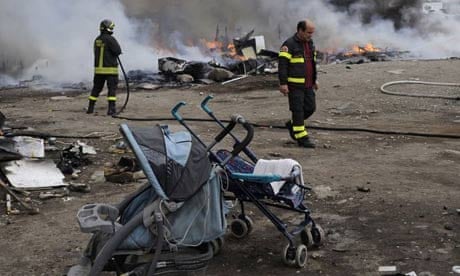Sixty-eight per cent of Italians, fuelled by often inflammatory attacks by the new rightwing government, want to see all of the country's 150,000 Gypsies, many of them Italian citizens, expelled, according to an opinion poll.
The survey, published as mobs in Naples burned down Gypsy camps this week, revealed that the majority also wanted all Gypsy camps in Italy to be demolished .
About 70,000 Gypsies in Italy hold Italian passports, including about 30,000 descended from 15th-century Gypsy settlers in the country. The remainder have arrived since, many fleeing the Balkans during the 1990s.
Another 10,000 Gypsies came from Romania after it joined the European Union in January 2007, according to an Italian human rights organisation, EveryOne, part of the approximately half million Romanians believed to be in Italy.
Romanians were among the 268 immigrants rounded up in a nationwide police crackdown on prostitution and drug dealing this week, after new prime minister Silvio Berlusconi's likening of foreign criminals to "an army of evil".
But Romanian officials have sought to distinguish between the Romanians and Romanian Gypsies entering Italy.
Flavio Tosi, the mayor of Verona and a member of the anti-immigrant Northern League party, said his city had the biggest Romanian community in Italy, 7,000 strong, "working as builders, artisans and domestics. And they themselves say the Roma are a problem," he said.
In a second poll, 81% of Italian respondents said they found all Gypsies, Romanian or not, "barely likeable or not likeable at all", a greater number than the 64% who said they felt the same way about non-Gypsy Romanians.
Young Neapolitans who threw Molotov cocktails into a Naples Gypsy camp this week, after a girl was accused of trying to abduct a baby, bragged that they were undertaking "ethnic cleansing". A UN spokeswoman compared the scenes to the forced migration of Gypsies from the Balkans. "We never thought we'd see such images in Italy," said Laura Boldrini.
"This hostility is a result of the generally inflammatory language of the current government, as well as the previous one," said EveryOne director Matteo Pegoraro. "Italian football stars at Milan teams assumed to have Gypsy heritage, such as Andrea Pirlo, are now also the subject of threatening chants."
Commenting on the attacks in Naples, Umberto Bossi, the head of the Northern League party said: "People are going to do what the political class cannot."
The defence minister, Ignazio La Russa, said yesterday he would consider deploying soldiers to Italian streets to help fight crime, while a group of Bosnian Gypsies in Rome said they were mounting night guard patrols of their camp to defend against vigilante attacks.
Europe's leading human rights watchdog urged the government to prevent attacks on Roma communities. Christian Strohal, head of Vienna-based OSCE's Office for Democratic Institutions and Human Rights, said: "The current stigmatisation of Roma and immigrant groups in Italy is dangerous as it ... increases the potential for violence."
· This article was amended after publication on Saturday May 17 2008 to correct the figure in the eighth paragraph from 61% to 64%.
